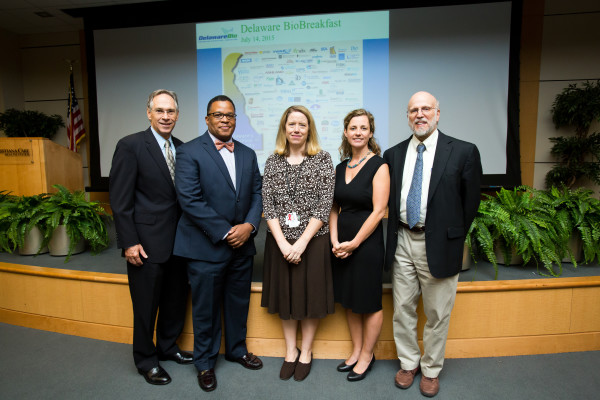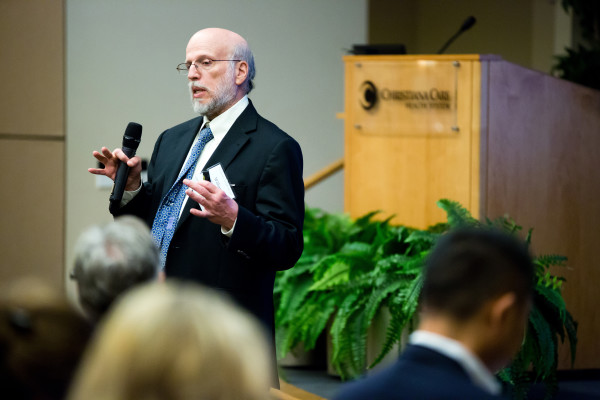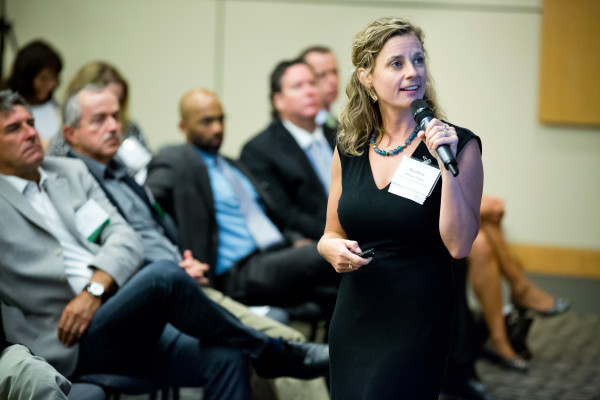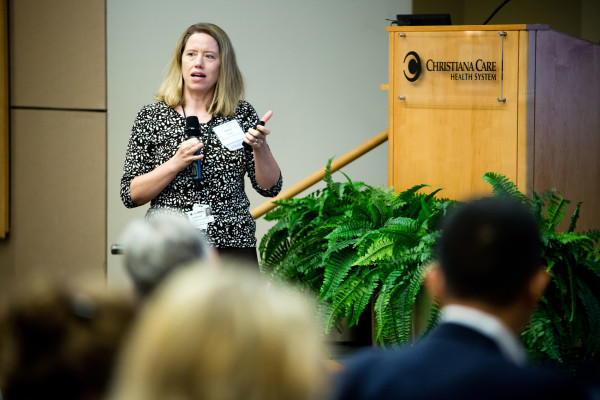Sold-out BioBreakfast attracts 170 Delaware industry experts for cutting-edge bioscience news
A diverse audience representing all facets of the state’s bioscience industry attended the Delaware BioBreakfast to network and hear about major research initiatives and other work under way at Christiana Care Health System.
The BioBreakast, co-hosted by the Value Institute and Delaware BioScience Association, has been held annually at Christiana Care for nearly a decade, growing from a small roundtable discussion for Delaware’s life science and biotechnical communities to the sold-out crowd of 170 attendees at this year’s event at the John H. Ammon Medical Education Center.

This year’s featured speakers were William S. Weintraub, M.D., MACC, FAHA, FESC, John H. Ammon Chair of Cardiology and director of the Center for Outcomes Research at the Value Institute; Heather Bittner Fagan, M.D., MPH, FAAFP, associate vice chair of research, Family and Community Medicine and a Value Institute scholar; and Marci Drees, M.D., MS, FACP, DTMH, infection prevention officer and hospital epidemiologist, and Value Institute scholar.
Weintraub and Bittner Fagan spoke about progress being made to advance clinical and translational research through the Delaware CTR-ACCEL program, while Drees talked about the responsibilities of a hospital epidemiologist. Christiana Care and its CTR-ACCEL partners — the University of Delaware, Nemours/Alfred I. duPont Hospital for Children and the Medical University of South Carolina (MUSC) — are midway through a five-year, $20 million grant from the National Institutes of Health that was supplemented by $5 million from the state of Delaware and $3.3 million from the partnering institutions.

“Our colleagues at major universities like Harvard, Stanford and Johns Hopkins have taken notice of this partnership,” Weintraub said, highlighting some of the accomplishments of the program since it began in 2013. Delaware CTR-ACCEL has solicited, reviewed and funded four big-data grant projects from seven proposals. Two of the funded projects are from Christiana Care, including one looking at large data sets to study and improve care for patients in Delaware with chronic kidney disease.
The program has solicited and funded 10 pilot project grants — including four from Christiana Care, three from Nemours, two from the University of Delaware and one from MUSC — to help test research ideas for a year and provide application assistance to investigators with projects that are strong contenders for future NIH funding. Three such projects from the grant’s first fiscal year already have been renewed for a second year of funding. The program also has funded 18 Mentored Research Development Awards to allow investigators to spend at least 20 percent of their work time over a six-month period on a research proposal.
To enable potential researchers and engage the community, the program hosts the Innovative Discovery Series, a series of lunchtime presentations on topics ranging from research methodology and biostatistics to epidemiology and public health issues. The presentations are free, available online and open to all four participating institutions and the broader community.
Additionally, the program funds small awards of about $20,000 each to promote research that involves and engages community members.

Dr. Bittner Fagan explained the importance of the ACCEL Community Engagement (ACE) Awards, which are available to teams — typically new research teams — that pair an academic researcher with a community researcher to tackle issues of importance to patients and the community. Award recipients have included a behavioralist paired with a community leader in cancer survivorship researching the physical-activity needs of cancer survivors in Delaware; another paired health services researchers with community health workers and patients to develop a tool to demonstrate how patients value community health workers.
“Research is criticized for having a lack of impact,” Dr. Bittner Fagan said. “Community engagement is a powerful vehicle for bringing about environmental and behavioral change and impact. When we focus research on patients coming into academic health institutions, we’re getting a tiny percentage of the population. We are working to move research from ‘in’ or ‘on’ or ‘for’ to ‘with’ a community.”

Dr. Drees, the third speaker at the BioBreakfast, changed topics to focus on the array of infection-prevention and disease-control issues a hospital epidemiologist handles in the course of her job. During a single week, Dr. Drees’ responsibilities can include such diverse tasks as: creating a staff vaccination plan for the upcoming flu season; looking at procedural changes to reduce infections a patient could acquire while in the hospital, such as central-line-associated bloodstream infections or Clostridium difficile; and tackling Christiana Care’s Ebola preparedness planning. The planning pays off; long before most people are even thinking about flu season, Christiana Care is prepared with an aggressive plan to improve voluntary vaccination among staff, including setting up shot stations at hospital entrances so that employees can get vaccinated on their way into work rather than traveling to a clinic. The work has increased the health system’s vaccination rate to beyond 90 percent.
Thanks to a plan that focused on cultural as well as procedural changes in the ways central lines are put in and managed by doctors and nurses, Christiana Care has seen a dramatic decrease in the incidence of infection.
“Transparency may sometimes feel like a curse, but it’s really a blessing; it helps galvanize the health system to continually improve,” Dr. Drees said. “If we can change the culture on a unit, that’s what makes the change. We can’t just institute policies and expect change; we need to think of the nurses and other staff who handle patients every day and find ways to improve that make their lives easier rather than harder.”
The BioBreakfast is co-sponsored by the Delaware Biotechnology Institute, Delaware Technology Park, Potter, Anderson & Corroon and VWR International.
“The information shared during these breakfasts often can lead to institutional collaborations, such as early stage companies incubating and working on new diagnostic tools and potential treatments with clinicians and researchers at the Helen F. Graham Cancer Center & Research Institute,” Delaware BioScience Association President Bob Dayton said. “In the end, the Christiana Care Delaware BioBreakfast collaboration is about providing better health care outcomes for patients, while at the same time fostering innovation and rewarding, well-paid jobs in the region.”